2022 HR Trends Report
What will HR look like post-COVID?
The good news: Overall, the shift to remote work seems to be a
good thing. HR pros are seeing improvements in employee well-being, and the move hasn’t made their jobs significantly harder.
COVID-19 changed everything for the HR industry. Now, over a year after the pandemic began, we’re checking in to see how HR professionals are doing.
The bad news: The vast majority of HR professionals are feeling challenged and exhausted by the pandemic. And they’re facing even bigger hurdles with the Great Resignation and the need to rapidly improve their diversity, equity, and inclusion (DEI) efforts. This report examines these issues from the eyes of HR pros across the United States, from associates up to the C-suite—and ultimately asks how HR technology is helping to make things easier.
Want to see the full PDF of the report? Click the button below.
The sections in this report are:
- Top 10 HR Trends Report Statistics
- The State of HR in 2022
- How Do HR Pros Feel About Remote Work?
- Decoding the Great Resignation
- Thinking Differently About DEI in 2022
- The Impact of HR Technology
- Methodology and Demographics
Top 10 Statistics from the 2022 HR Trends Report
- 74% of HR professionals feel challenged by the pandemic.
- 85% of HR professionals agree with their company’s remote work policy.
- 31% of company-related resignations during the Great Resignation are due to stressful working conditions
- 30% of employee-related resignations during the Great Resignation are due to people having gained perspective on what is important in their lives
- 14% of HR professionals think that people are taking advantage of the pandemic to make demands, and 10% think they’re hoping to max out government assistance
- 71% of HR professionals think that the Great Resignation will impact their DEI efforts.
- 77% of U.S. HR professionals think that the Great Resignation is a permanent change in the labor market.
- 60% of HR professionals think their companies are diverse.
- 55% of HR professionals say that they’re spending more on HR technology right now.
- 49% of HR professionals think their HR technology helps them prevent bias.
The State of HR in 2022
How do HR professionals feel right now?
After a year of grappling with the COVID-19 pandemic, HR teams feel challenged (74%) and exhausted (38%) by the pandemic. They also find that their work during this time is energizing, exciting, and frustrating.
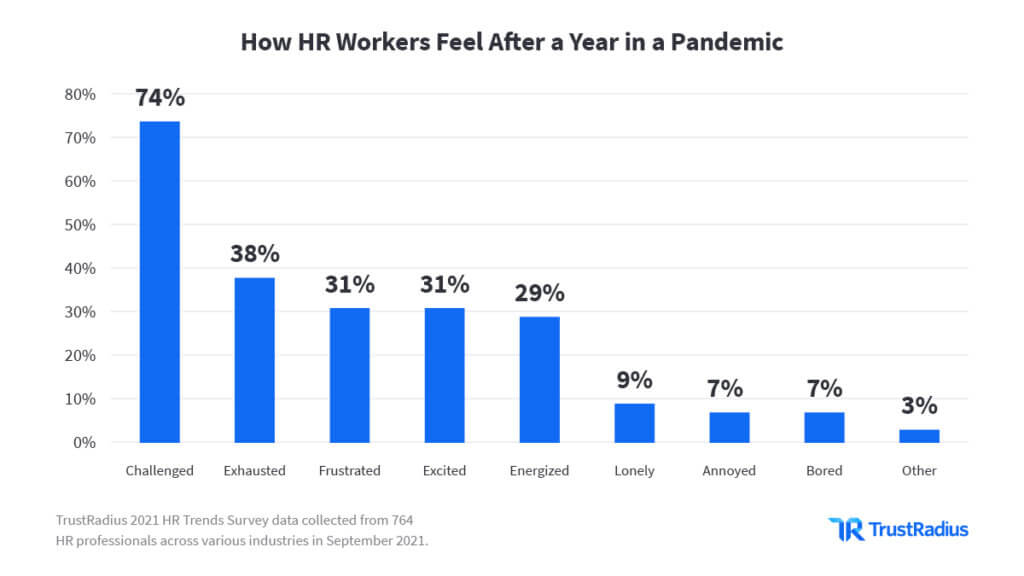
Who are HR professionals today?
Our survey data revealed that United States HR departments are predominantly female (64% vs. 36% male) and overwhelmingly white (82%). According to the U.S. Bureau of Labor Statistics, these trends are representative of the U.S. HR industry as a whole. The tech industry is a notable exception. Men makeup 51% of tech HR teams in the United States and hold 53% of tech HR leadership positions.
47% of HR leaders in the tech industry are women, and 2% identified as non-binary. 82% of tech HR leaders are white. While this may look like tech HR teams have achieved gender parity, this actually points to the continued under-representation of women and people of color in the tech industry. In non-tech industries, female HR staff are more than twice as prevalent than men (67% vs. 33%).
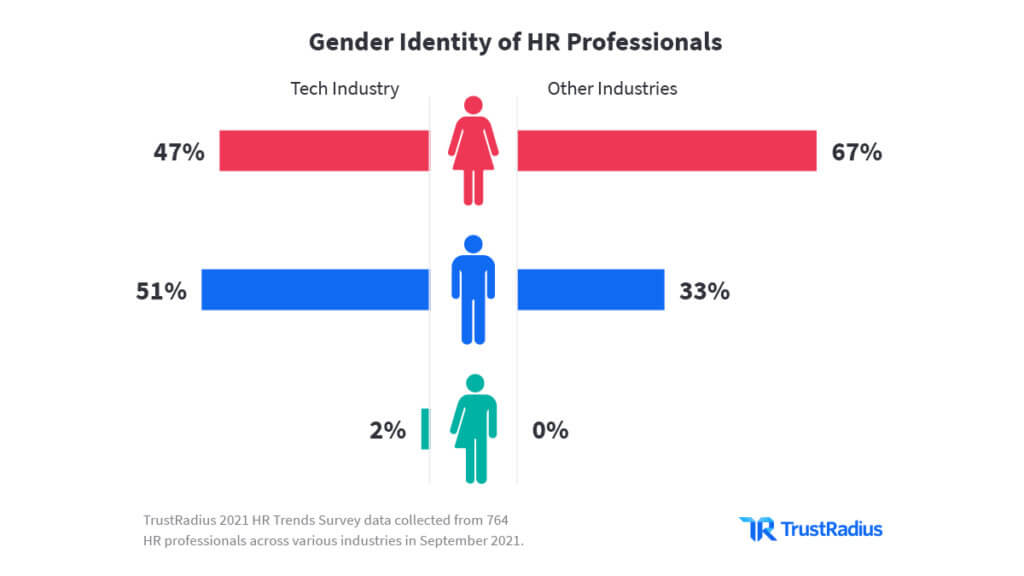
How Do HR Pros Feel About Remote Work?
Most HR pros work in hybrid companies
As of October 2021, 50% of HR professionals work at companies with a hybrid remote/in-office workforce. 21% of their companies are fully in-office, and 16% are fully remote. Tech companies were the most likely to offer a fully flexible
remote work policy (19% vs. 9% for non-tech).
They were also the least likely to be 100% in-office (7% vs. 23% for non-tech). The vast majority of HR professionals agree with their company’s remote work policy—likely because they had a hand in writing it. 90% of the HR leaders we surveyed agree with their company’s remote work policy, compared to 77% of managers and below.
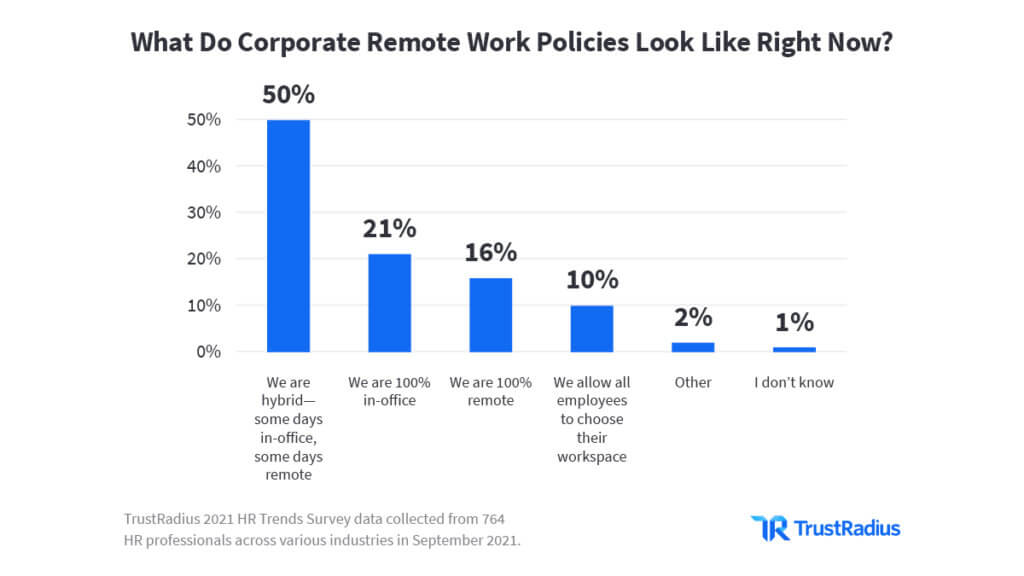
Working from home may increase productivity
Overall, HR professionals are split on whether remote work has a positive effect on productivity.
Nearly half of HR pros (48%) say that remote work increases productivity, although an equal number say that it either decreases productivity (26%) or has no effect whatsoever (22%).
We weren’t surprised to see that HR pros at office-only companies are the most likely to think that remote work has a negative effect. 42% of office-only HR pros say that remote work decreases productivity. Those in fully remote environments strongly disagree: 59% of fully remote HR pros feel that remote work improves productivity.
This trend matches our previous research on the tech industry. Back in June 2020, 57% of tech employees said that working from home made them more productive.
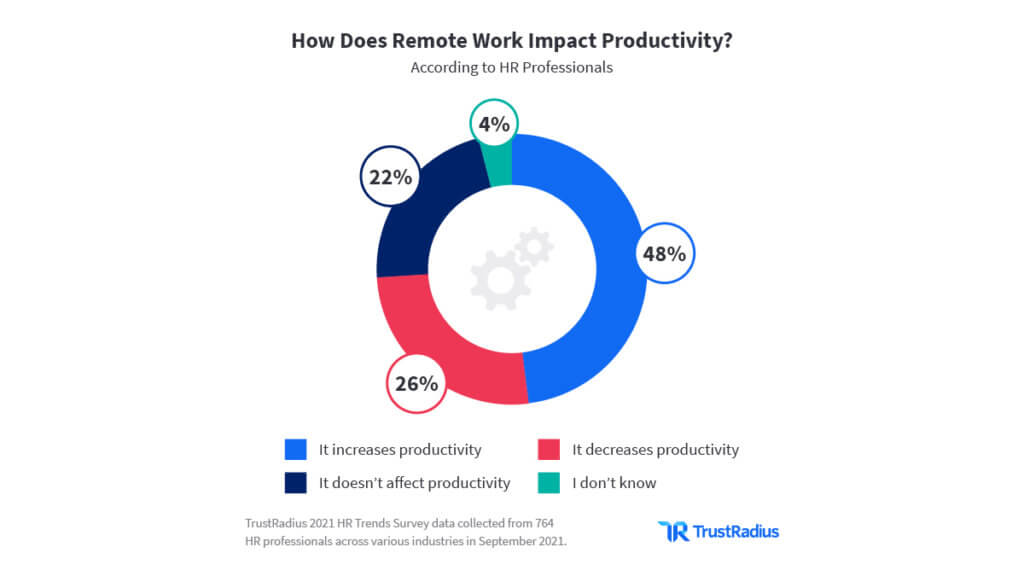
Remote work improves employee well-being
A clear majority of HR professionals—65%—say that working from home increases well-being. Just 18% believe it has a negative effect. This data varies widely by remote work policy and by demographic. HR workers at office-only companies are the least likely to say that remote work improves employee well-being (45%) and most likely to say it has a negative effect (31%).
In contrast, 72% of HR professionals in hybrid environments see an improvement. HR professionals in the Millennial generation have the most favorable opinion of remote work, finding it increases both productivity (58%) and well-being (72%). We also found a significant disparity with race. 68% of white HR professionals believe that remote work improves employee well-being, compared to 57% of professionals of color.
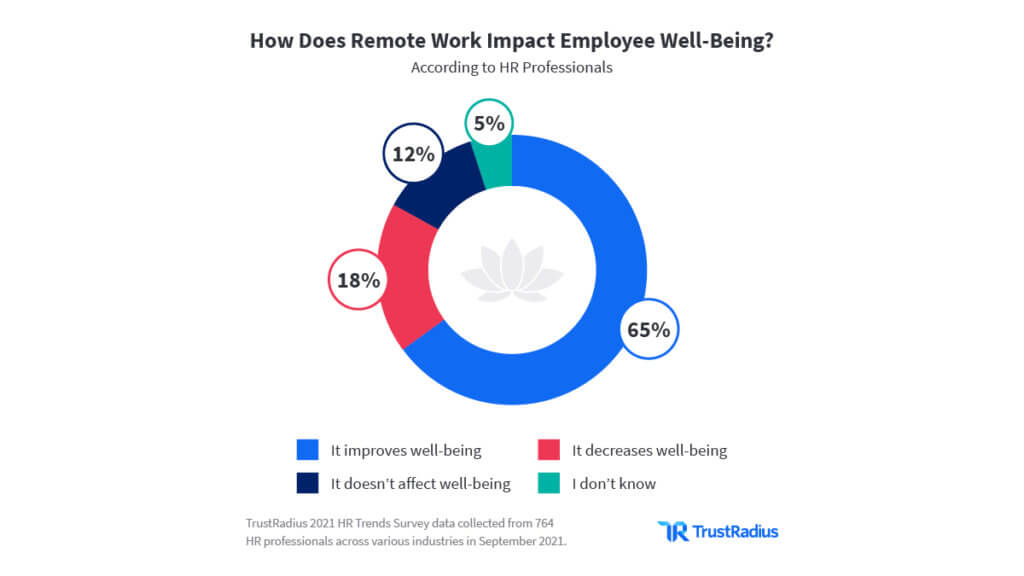
WFH has a mixed impact on HR’s work
When we asked if remote work impacts the ability of HR professionals to deliver service to employees, responses were evenly split. 31% say remote work makes it more difficult, 32% think it’s easier, and 35% say it makes no difference at all.
Here again, respondents who work in office-only environments take the opposite view to those in more flexible companies. 39% of office-only HR pros say that remote work makes their job harder. In a direct reversal, 38% of HR professionals in flexible organizations say that remote work actually makes their work easier.
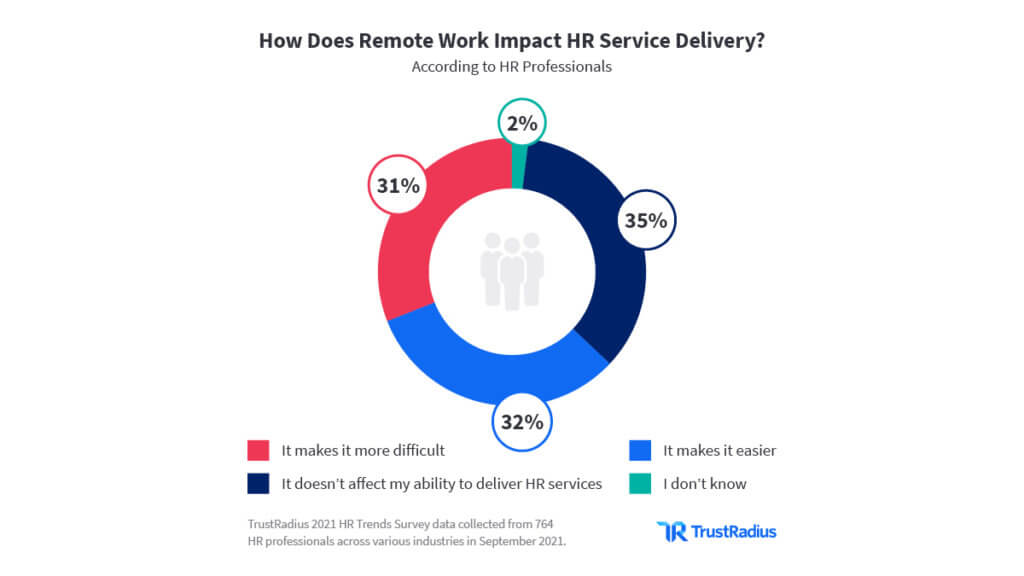
Decoding the Great Resignation
What caused the Great Resignation?
Employees in the United States are leaving their jobs by the millions. This upheaval is caused by a combination of things, including major economic factors and widespread shifts in thinking by both companies and their employees.
On the company side, HR professionals believe that the single biggest cause of the Great Resignation is stressful working conditions (31%). This was followed by low pay (16%), a lack of flexibility (15%), and a failure to address work/life balance (13%).
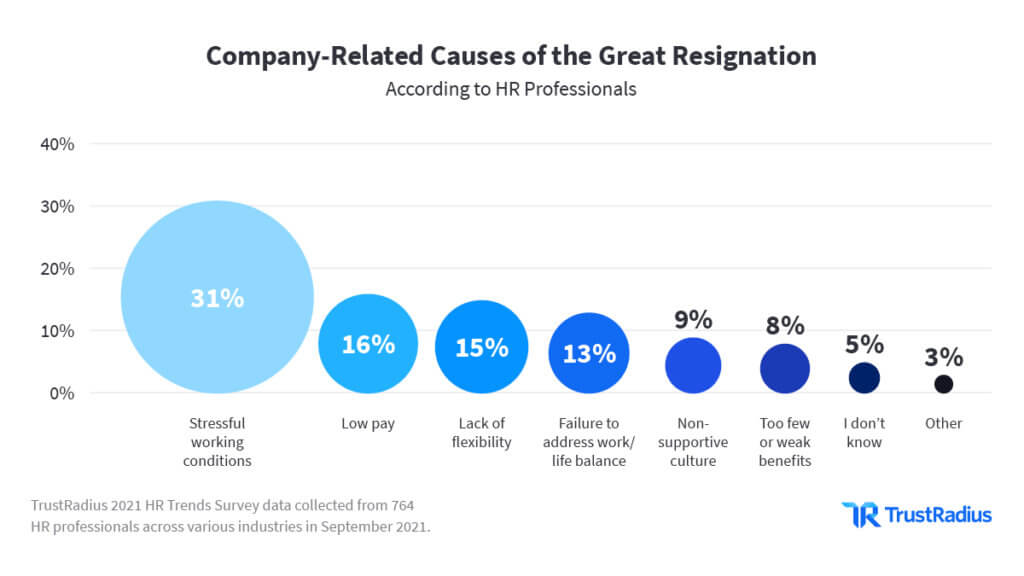
HR professionals of all genders tend to agree on those company-side reasons, with the notable exception of flexibility. 18% of women cite it as the primary cause compared to 12% of men. On the talent side, HR professionals think that the Great Resignation happened because people have gained perspective on what’s important in their lives (30%) or are reflecting on what they want from their career (18%)
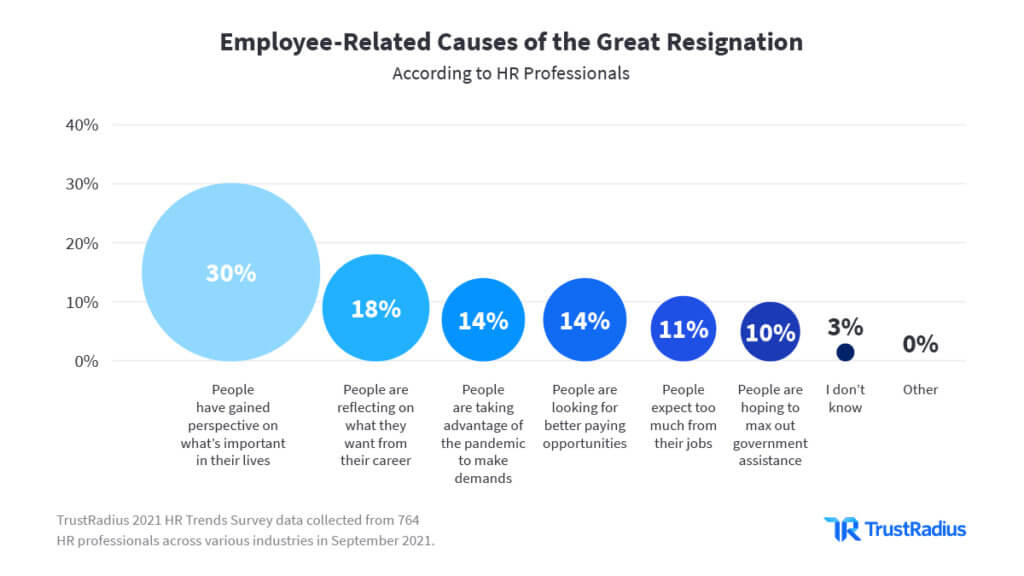
Exploring a small but skeptical minority
A small but significant group takes a more skeptical view. 14% of HR professionals think that people are
taking advantage of the pandemic to make demands, and 10% think that people are hoping to max out
government assistance before returning to work.
Here, we found a surprising result when we broke down responses by gender. Women were more likely than men to feel that people are taking advantage of the pandemic (16% vs. 11%) and hoping to max out government assistance (12% vs. 6%).
Leadership roles also widen the perception gap. HR managers and below are more likely than directors and above to say people are taking advantage of the pandemic (17% vs. 12%) or maxing out assistance (11% vs. 9%).
These results differ even more by remote work policy.
HR pros working in office-only companies are twice as likely to think that people are making demands thanks to the pandemic (22% vs. 11%) or that people are riding out government assistance (13% vs. 4%). On the other hand, HR pros in a fully remote environment believe that people have gained perspective on their lives at nearly double the rate (39% vs. 20% office-only).
The Great Resignation is probably permanent
A shocking majority of U.S. HR professionals think that the Great Resignation is a permanent change in the labor market. But when we asked how big the impact would be, we got mixed responses. 43% of HR professionals say that the Great Resignation will have a significant permanent impact. 33% think that those changes will be small. Again, this data varies by remote work policy.
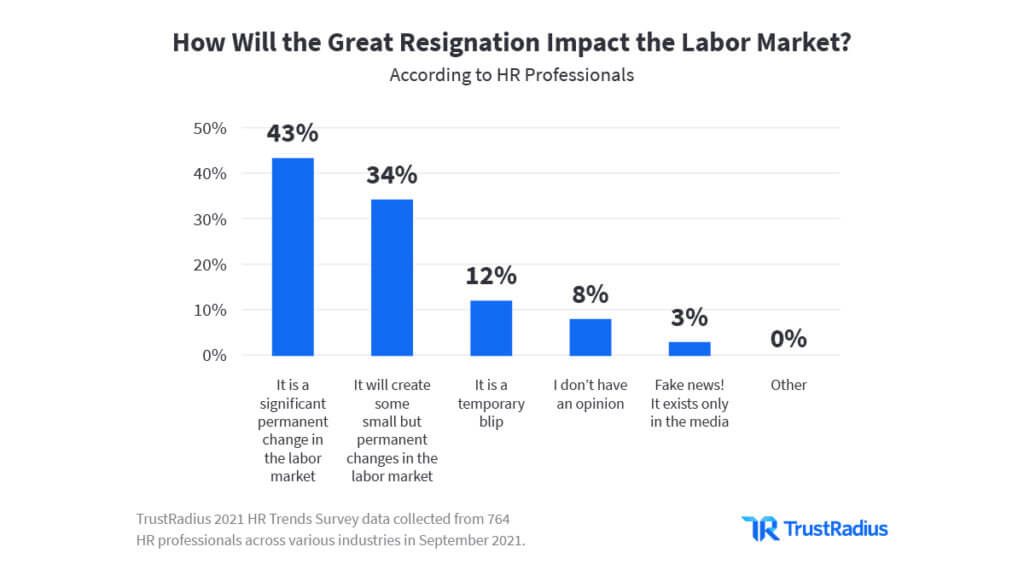
Thinking Differently About DEI in 2022
How the Great Resignation impacts DEI
71% of HR professionals said that the Great Resignation will have some impact on their DEI efforts. 41% see it as an opportunity to increase diversity. 44% think that it will require a complete rethinking of their efforts. Race and ethnicity had noticeable effects on these perceptions. 44% of white respondents called the Great Resignation a “significant permanent change,” compared to 37% of Black respondents and 38% of Latinx respondents.
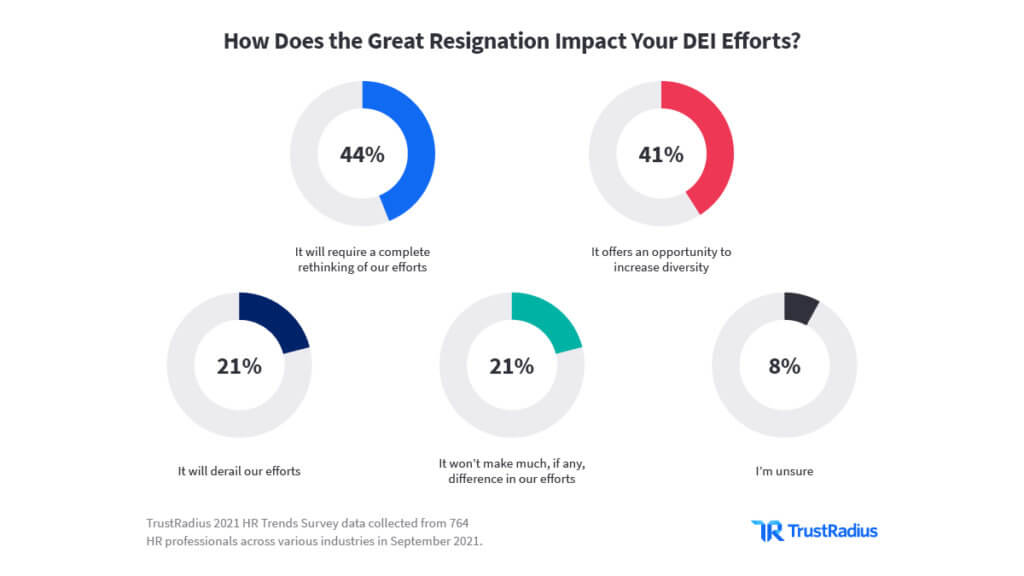
Are we succeeding with DEI?
Overall, HR professionals are divided on how they perceive their organization’s success at achieving diversity, equity, and inclusion right now.
While a majority (60%) describe their company as diverse, perceptions of equity (44%) and inclusiveness (43%) fall below the halfway mark. 6% of respondents say they don’t believe that their organizations meet any of these descriptions.
Race and ethnicity obviously influence these perceptions. But we were surprised to see that the perceptions of different groups did not diverge more than seven percentage points (for diversity and inclusiveness) and as little as two points (equity).
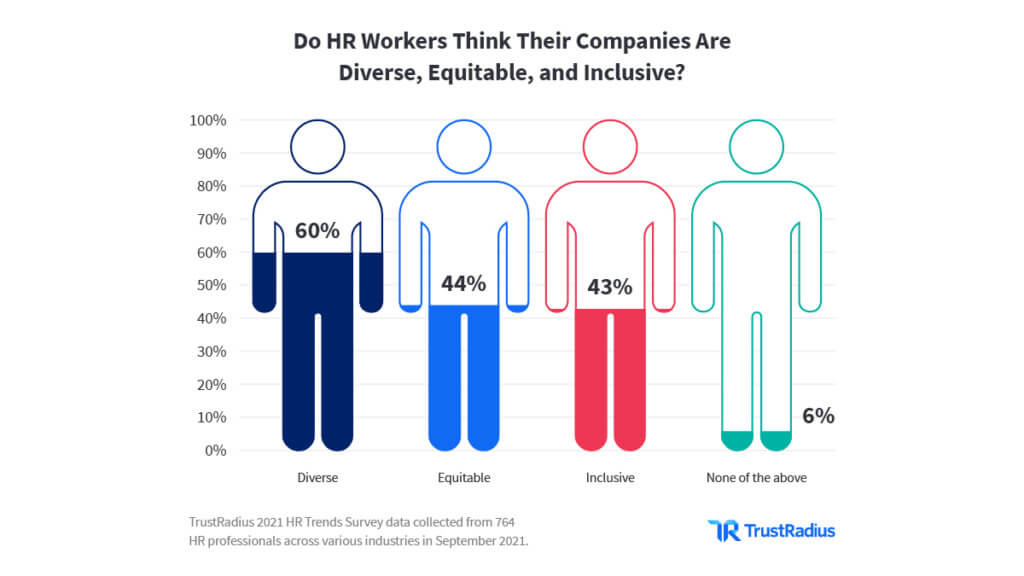
Remote work may correlate with DEI success
There’s a significant correlation between how companies approach remote work and how they perceive their DEI efforts.
HR employees at remote-only companies are the most likely to describe their organizations as “equitable” (51%), while office-only employees are the least likely to say that (35%).
HR professionals in hybrid workplaces are most likely to describe their company as diverse and inclusive (65% and 49% respectively) compared to peers in other work environments.
On the other hand, remote-only workplaces are less likely to see their companies as diverse.
Only 51% of fully remote HR employees think their company culture is diverse. This may be because the fully remote category includes a greater concentration of tech companies—which are less diverse than other industries (83% white vs. 73%).
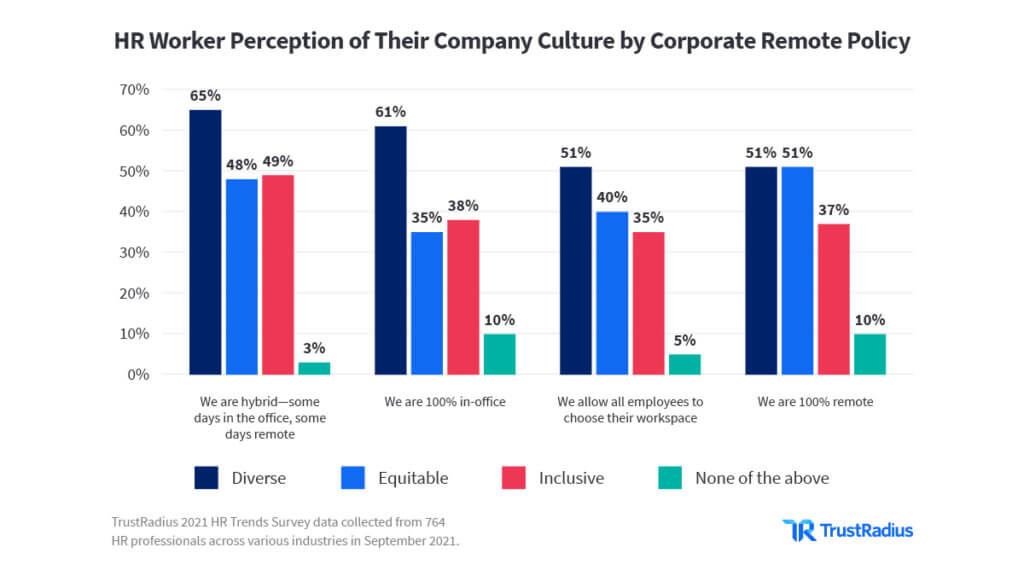
The Impact of HR Technology
HR teams are spending more on technology
HR software has experienced a massive boom in response to the pandemic. We expect this trend to continue well into 2022 and beyond.
55% of HR professionals say that their companies are spending more on HR technology right now. 45% are spending more in order to upgrade their existing tech stack, and 38% are purchasing new tech.
Across all industries we surveyed, tech companies were much more likely than non-tech companies to increase their HR tech spending, whether on new technology (56% vs. 37%) or to improve their existing technology stack (67% vs. 44%). This boom is likely caused by both the shift to remote work and the Great Resignation.
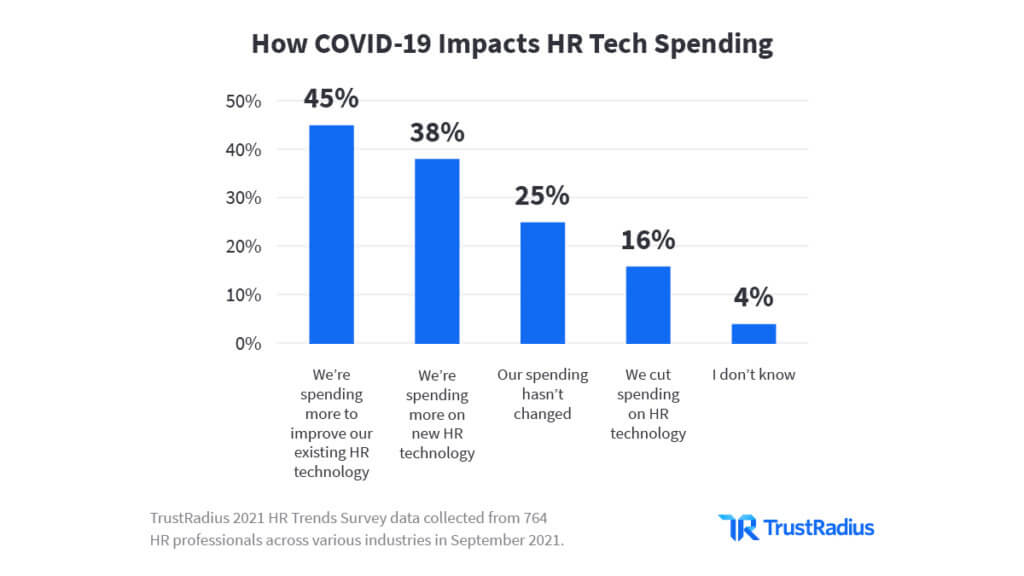
HR technology may prevent hiring bias
There is a debate going on in HR circles about what effect, if any, HR technology has on unintended bias. Our respondents have a largely, but not exclusively, positive take on the matter. 49% of think that their HR software helps them prevent bias in hiring, while 15% say that their software reinforces existing bias.
However, this perception differs significantly by gender. 62% of men believe that their HR software helps them prevent bias compared to only 43% of women. Women were also more likely to think that their software has no impact on their diversity efforts.
Overall, will we see HR software companies meet the needs of the post-COVID world?
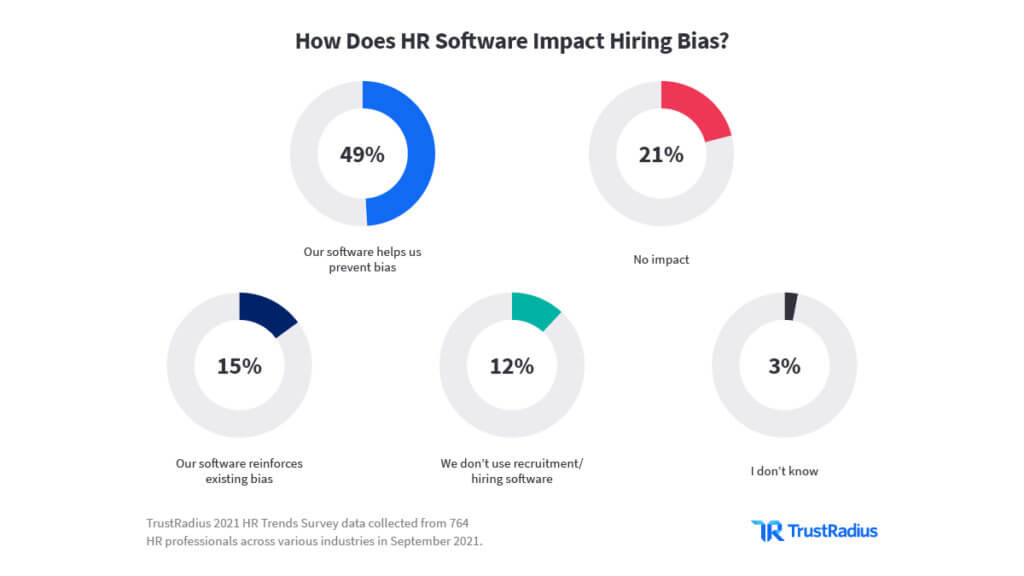
Methodology and Demographic information
The TrustRadius 2022 HR Trends Survey was conducted by email outreach. We received responses from 764 HR professionals across various industries in the United States. All responses were anonymous to assure privacy and allow respondents to share their honest answer.
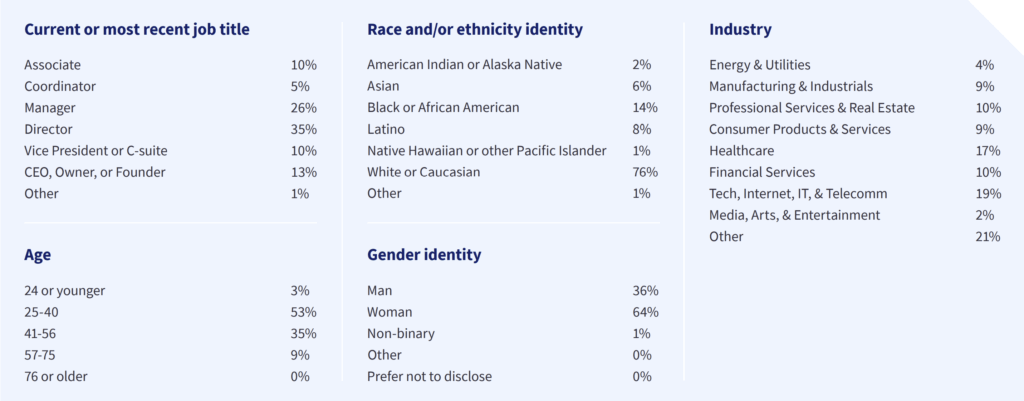
Was this helpful?

Want to see the full PDF version of the 2021 HR Trends Report? Click the button below to download now!
